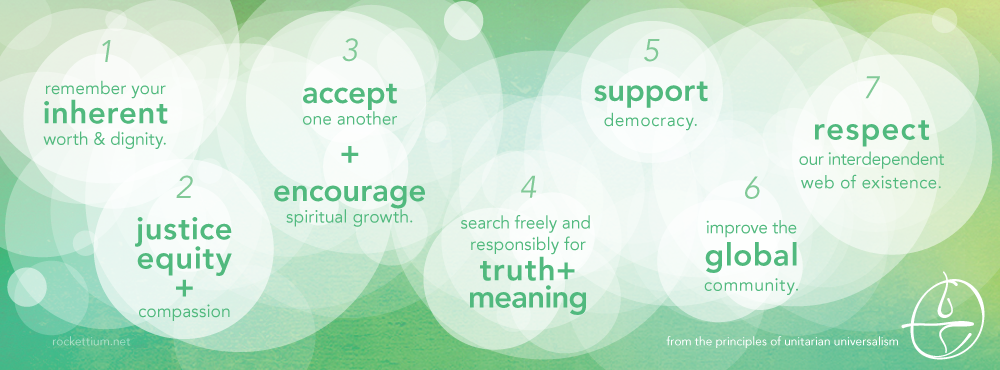
Our Principles and Sources are our answer to being a non-creedal religion, with people of differing Sources coming together to form a liberal religious community. No matter your source of wisdom: Christianity, Humanism (atheism), Earth Spirituality, Judaism, etc., we agree that it shall lead to our fulfilling our Principles in life. It’s kind of like our shorthand of scripture, all the UU stories and parables distilled into our code.
The cool thing about the Principles is that we vote on them, so they can be changed as we and society need them to change for us to be a better people, and make a difference in the culture around us.
The seven Principles and six Sources of the Unitarian Universalist Association grew out of the grassroots of our communities, were affirmed democratically, and are part of who we are.
We, the member congregations of the Unitarian Universalist Association, covenant to affirm and promote:
Our Principles
- 1st Principle: The inherent worth and dignity of every person;
- 2nd Principle: Justice, equity and compassion in human relations;
- 3rd Principle: Acceptance of one another and encouragement to spiritual growth in our congregations;
- 4th Principle: A free and responsible search for truth and meaning;
- 5th Principle: The right of conscience and the use of the democratic process within our congregations and in society at large;
- 6th Principle: The goal of world community with peace, liberty, and justice for all;
- 7th Principle: Respect for the interdependent web of all existence of which we are a part.
Our Sources:
- Direct experience of that transcending mystery and wonder, affirmed in all cultures, which moves us to a renewal of the spirit and an openness to the forces which create and uphold life;
- Words and deeds of prophetic women and men which challenge us to confront powers and structures of evil with justice, compassion, and the transforming power of love;
- Wisdom from the world’s religions which inspires us in our ethical and spiritual life;
- Jewish and Christian teachings which call us to respond to God’s love by loving our neighbors as ourselves;
- Humanist teachings which counsel us to heed the guidance of reason and the results of science, and warn us against idolatries of the mind and spirit;
- Spiritual teachings of Earth-centered traditions which celebrate the sacred circle of life and instruct us to live in harmony with the rhythms of nature.
